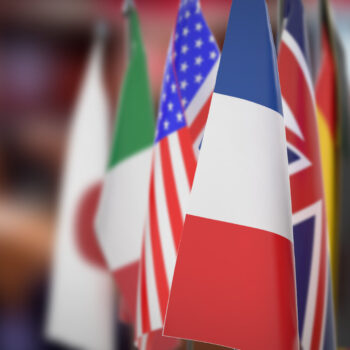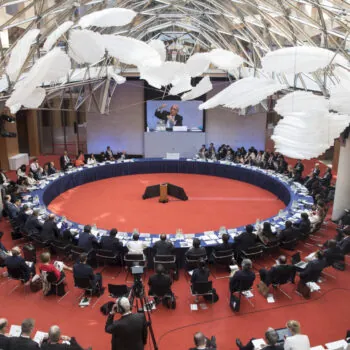Last month a flurry of activity from business, former world leaders and campaigners was directed at EU environment ministers as they decided Europe’s priorities for the Paris climate talks. In among the stodgy language (to be expected following a 28-way ministerial negotiation!), Europe made important progress. EU leaders meeting this week should build on this, spelling out why a global climate agreement matters for Europe and how Europe will help to deliver it.
Facing up to the challenge
There is now collective EU agreement on the need for Paris to set out a process where countries come forward with “new or updated commitments, without falling behind previous levels of commitment, or resubmit the existing ones”. Parties will return to the table every 5 years, until they deliver “sustainable climate neutrality and climate resilience in the second half of this century” in line with the G7 agreement to global decarbonisation over the course of the century.
EU support for a long-term goal and a process to increase ambition every 5 years will help ensure that Paris keeps for the door open for countries to limit global temperature rise below 2°C – the internationally agreed threshold for dangerous climate change. The slew of national pledges submitted in the last month means the majority of countries now have plans to cut their emissions. The latest analysis of these INDCs shows that we’ve come a long way, and are now roughly on track to keep temperatures at 2.7°C[1], but even at this level of effort governments will fail to protect their citizens from unmanageable climate risk. But with two months to go until COP21, there’s still time to build a Paris deal that tackles this issue head-on. The stakes are too high for EU leaders to dismiss discussions on a long-term goal and ratchet mechanism as too techy to make it on to their agenda.
Make some noise
Hard-won EU unity, particularly when the EU is facing multiple crises, should be celebrated and used for maximum effect. With its common position in hand, the EU is now well-placed to steer a Paris agreement that can tack us back on course. To reap the rewards internationally from the EU’s internal agreement – and the EU’s head start in decarbonising – EU leaders can’t drop the ball. They should take ownership of the common EU position and affirm their ministers’ agreement on a strong long-term goal and a ‘ratchet mechanism’ as core elements for a strong deal in Paris.
A particularly useful intervention would be for EU leaders to talk up Europe’s vision for Paris with international partners who are still sitting on the fence or holding their cards close to their chest. There is notable reluctance by a small group of countries and companies to set up an enduring regime that compels countries to raise ambition every 5 years, benchmarked against a zero emissions goal. After all, scheduling discussions in the international spotlight every 5 years with the express aim of upping ambition gives blockers and low-ambition forces very little space to hide. Ensuring climate action can’t slip too far down governments’ agenda through regular target-setting also puts a squeeze on fossil fuel companies, as the push to get off dirty energy is reinforced again and again.
Bold vision reaps rewards
Merkel, Hollande, Cameron and Renzi well know the impact they can have if they stand up for the bold vision that must underline the Paris Agreement: they won’t struggle to remember June’s stunning front pages proclaiming ‘G7 leaders agree to phase out fossil fuels’. Indeed, the EU may even be able to claim some credit already for Obama following EU ministers’ lead and coming out in support of Paris setting up regular moments to ratchet up ambition to deliver the 2C obligation.
Taking a proactive stance on regularly increasing ambition would enable the EU to demonstrate that it can close the gap on 2°C – and that Paris isn’t just a platform to applaud the US/China agreements. EU leaders are more than capable of building a coalition of countries around the need for regular reviews to ratchet up ambition, starting ahead of the Paris deal coming into force in 2020. This is one of the best levers at the EU’s disposal to disrupt low ambition lock-in from China, Australia, Canada and Japan. Many of the most vulnerable nations to climate change rely on Europe to take on this role, not to mention the Europeans living in climate vulnerable hotspots themselves.
Bringing Paris home
As the last gathering of EU leaders before COP21, this week’s summit is also an important moment for each of them to explain why Paris matters to citizens, businesses and local governments, i.e. the people who will deliver whatever is agreed in December on the ground.
As EU Commission president Jean-Claude Juncker told MEPs, “The fight against climate change will not be won or lost in diplomatic discussions in Brussels or in Paris. It will be won or lost on the ground and in the cities where most Europeans live, work and use about 80% of all the energy produced in Europe.”
We’re already seeing huge changes all around the world, from renewable energy pushing fossil fuels off the system to mass divestment to cities banning coal to deliver a better quality of life for their citizens. But we know we must go further. Paris could hold the key to unlock a massive realignment of investment to accelerate the transition to a fossil free economy, empowering smart business models and ultimately showing that the global community can work together to protect citizens. To make this a reality, governments will need to convince citizens and real economy decision makers that Paris is worth paying attention to and show them that they, as European leaders, mean business. While the outcome of Paris may be not crystal clear given the forces of play, its significance will depend on the transformational changes it catalyses far beyond COP21. To get a head start, governments need to be opening up national conversations about what Paris means right now.


